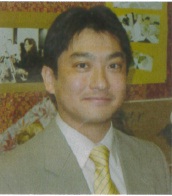Masahiko Kaneko — Helping the physically and mentally challenged
by Kirk R. Patterson
Masahiko Kaneko (36) is the Associate Executive Director of Tokyo YMCA’s West Tokyo Community Center. Included in his responsibilities is the operation of various recreational programs for mentally challenged children and adults.
What led you to your current position?
I was born and raised in Tokyo. I graduated from the Social Welfare Department of the Japan College of Social Work in 1992, majoring in recreation program management. While in college, I was a volunteer in YMCA summer and winter camps for elementary school children, and then I joined the Tokyo YMCA as a full-time employee right after graduation. My first job was as a teacher at a school that trained sports instructors, and I was also a swimming teacher.
In 1998, I was transferred to the West Tokyo Community Center, I was involved in managing recreational programs for mentally challenged individuals.
Is it common for YMCAs in Japan to offer programs for the physically and mentally challenged?
Yes, the YMCA probably serves more physically and mentally challenged people than any other organization in Japan.
The first YMCA to offer programs in this area was the Kobe YMCA, which started organizing camps for those confined to wheelchairs in 1953. Gradually, other YMCAs introduced recreation programs for physically and/or mentally challenged individuals, so that today most of the 33 YMCAs in Japan have some type of challenged-related program.
Most widely known is the Challenged Children Program (CCP), which is a nationwide program of summer and winter camps and other activities developed to meet the special needs of mentally and physically challenged children and operated by various local YMCAs. In total, about 110 CCP camps and other programs are conducted every year, serving approximately 5,500 children.
What programs do you operate at the West Tokyo Community Center?
Basically, we have two types of programs, both for mentally challenged individuals. The first is a day camp operated one Sunday every month, with outdoor activities, like picnics and barbeques, and indoor activities like bowling and karaoke. About 20 people join each time, and they are divided into two groups, one for children and the other for adults.
The other type of program is the overnight camp. Each camp is held at the YMCA facility at Lake Yamanaka, near Mt. Fuji. There is no fixed program or schedule, but rather each individual is allowed and encouraged to do whatever he or she wants, such as boating, hiking, cycling, woodwork, and so on.
What challenges are encountered in operating these programs?
The principal challenge is financial. These programs are very expensive to operate, but in many cases the families cannot afford the participation fees. As a result, the programs rely on subsidies from the YMCA and on donations. Even with this support, though, many physically and mentally challenged people cannot afford to participate in the programs for financial reasons.
A second challenge is staffing. The overnight camps, in particular, are difficult to staff because we need to maintain a one-to-one, camper-to-staffer ratio. We rely heavily on volunteers to staff the camps, but it is often hard to find enough volunteers and to give them the training necessary to work with mentally challenged individuals.
A third challenge is the fact that many of those most in need of special attention are now adults. When our programs were started, they focused primarily on serving physically and mentally challenged children, but now, with the aging of Japanese society and the longer life expectancy of those suffering from Down’s Syndrome, we are dealing more and more with adults, who have their own unique set of needs and circumstances.
What is your future goal for these programs?
Ideally, we look forward to a future where special programs for the physically and mentally challenged are unnecessary. Rather than isolating the mentally and physically challenged in separate programs, we should integrate them into society. That will require, however, more and better training of the challenged individuals and changes in society at large.
External Link:
YMCA Japan









